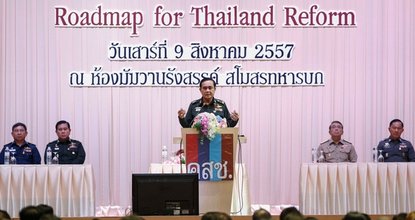
Prime Minister Gen Prayuth Chan-ocha mentioned, somewhat candidly, at one point during his official policy announcement that some of his reform plans may take a lifetime to complete.
Browsing through his 31-page dream for Thailand, I find the PM's tongue-in-cheek remark could be more credible than his official statement. It's not that I don't agree with his 11-point policies. Reducing inequalities, improving Thai people's competitiveness or promoting sustainable use of natural resources have always been staple issues in the country's development agenda.
These broad ideas have hardly caused divisiveness in principle. In practice, however, they have proven to be problematic.

The Pheu Thai government, for example, viewed that income gaps could be bridged by hiking the minimum wage or giving guarantee prices for rice farmers. Those who stand on the opposite side, the junta included, however, argued that those are short-sighted plans that care less about the country's macro-economic reality than the party's own need to secure its popularity.
So it is fair to say that I agree in principle with PM Prayuth's vision for the future and wish that he could successfully implement it within his one-year tenure and not many epochs. Still, I have a concern that his well-written platform is lacking a few crucial elements. Where is the part about power decentralisation? Where do the military and police reform go?
The general said he wanted to strengthen the country's administration at every level, from local to national. In the specific part about administrative reform, however, he focuses on streamlining the massive-but-slow bureaucracy, driving anti-corruption efforts and reclaiming ''honour'' for civil servants.
The only mention about decentralisation is to make public services accessible to the public at low cost, with ease and convenience. Speedy services will be nice but they hardly constitute the heart of administrative reform. The heart of the reform lies in the need for power to be spread out and put in the hands of citizens as much as possible.
Decentralisation is necessary because it's the only way for us to get away from the cycle of corrupt politicians, biased laws that benefit the wealthy, inert bureaucrats that only serve people in power and the military that can always push democracy back by staging a coup.
As owners of the country, Thais must know in which direction the country is growing, which areas the new city plan will cover, in what zone our land is classified and where new roads will be built, Gen Prayuth said.
The only way for Gen Prayuth to realise his own dream is for him to empower the people. He has to turn them into informed and engaged citizens and give them room to make decisions about their own future. Unfortunately, the PM in his policy statement was more content to make the cumbersome bureaucracy the master of the citizens' destiny. It is easy to foresee how he will fall short.
I am not pro-politician when I said I want administrative power to be decentralised and local communities to elect their own representatives and influence policies that affect them. I support the junta's attempt to balance out the overwhelming power of elected representatives with effective monitoring systems.
I have also seen tambon or provincial administrative organisations squander public money for projects that are not seemingly worth it. Still, I believe that local administration is the only path towards a future that corresponds to public aspirations, that is diverse enough to accommodate increasingly different interests and to hold them together in relative stability.
It's clear we have a steep learning curve ahead. Citizens will have to learn to keep in check local politicians who spend public money on wine that costs 100,000 baht a bottle as alleged by PM's Office Minister Panadda Diskul, just like they did the Government House that fast-tracked the procurement of microphones that cost more than 100,000 baht each.
Decentralisation, however, is not possible without the military and police reform. As long as these two forces are allowed to function the way they have and retain their usurping powers, there is no room for citizen-based organisations to grow. PM Prayuth wants other organisations to improve themselves but he never explains why the military needs more than 1,000 generals. Besides, whatever reform plans are put into place, they can all go to waste if the next army chief can stage a putsch whenever he has the guts to do so.
Atiya Achakulwisut is Contributing Editor, Bangkok Post.
